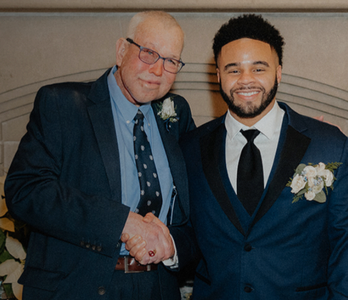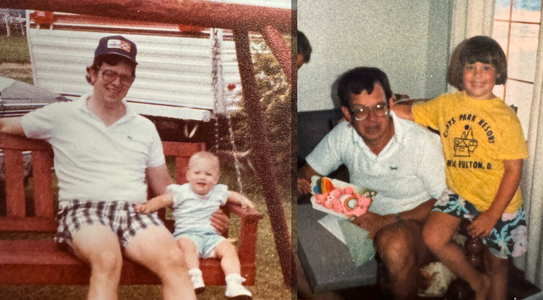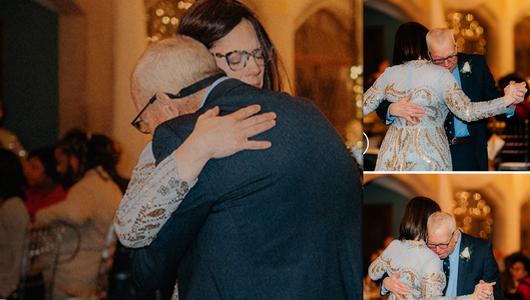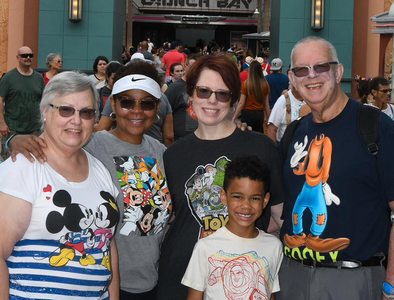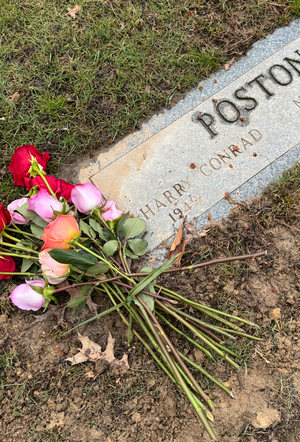Journal entry by Ann Poston Barnett —
The Should-Have's and the Should-Not-Have's
It's nearing two weeks since my dad died, and I have grieved stronger than I ever thought I would–because we were given the blessing of getting extension after extension with my dad's life. I should have been better emotionally prepared (or so says the perfectionist part of me).
Many, many others face the abrupt loss of loved ones through violence or tragedy, so I should be more thankful (or so says the justice-seeker part of me).
I should be more grateful and less full of grief (or so says the benevolent part of me), and I should be more focused on the memories of my dad rather than his loss (or so says the rational part of me). He lived well beyond the first mention of hospice in August 2023, with an estimated two months of life expectancy.
I know, like you do, that people grieve differently. I'd even be the friend telling me that it's okay to grieve for as long as you need to grieve, and I'd be the one telling me that I shouldn't feel bad about how I have been grieving. I shouldn't feel guilty or weak, and I shouldn't feel ashamed or comparative.
I also know that (with the thinking part of my brain screwed on more tightly than the emotional part), that "should-haves" and "should-not-haves" never get us anywhere ... Except, it did get me here writing this post, written to be my final post (and tribute) to my dad on this site.
A Deafening Silence with Discovery
As much as I can still hear the sound of his final heartbeats, much of the next ten days remain a blur. While my first task upon arriving home was to tell Emory that his beloved Grandpa had died, I can't tell you how I told Emory or even what I said. I don't even remember his reaction other than seeing the tears stream down his face. It's been such a blur that I asked JaNette just yesterday, "Did I really get pulled over by the State Patrol on my way home from Columbus?" The short answer: Yes; it wasn't a weird dream. Thankfully, tears brought me just a warning.
There are only two hours of the 240 available that remain crystal clear in my memory bank: my dad's local visitation in the Columbus area, something he wanted to do for my sister, who has called the area "home" for the past two decades. So, JaNette, Emory, and I made the drive back to Columbus last Monday to be there as support for my mom and in honor of my dad.
As soon as we arrived, I plugged in my computer to play the slideshow that I had feverishly pulled together over the weekend, and then I made my way to the other side of the large room, sitting down in the front row. My immense grief came over me again. I sat there by myself, at first, feeling the weight of how much more I was grieving. (in that moment) than anyone else. The flow of tears and the sound of sniffles were absent in any other part of the room, and I sat there in silence.
I was still trying to figure out why I was so disastrously emotional. Was it because my dad's final arrangements were night-and-day different than the other deaths I've recently experienced? Was it because most of my experience was in my wife's family and the list of notable differences in White and Black culture at times of death is long? Or was it because my dad chose cremation, and there was no casket and body next to the row of flowers? I then delved back into the long list of should-haves and should-not-haves.
JaNette soon joined me up-front and did her very best to console me, trading the wads of tears-filled tissue for a full tissue box. Soon, I recognized some of my sister's friends, as well as her in-laws. In total, I figured I would know (and talk to) about five or six people, and by 15 minutes in, I had already met my number. Then, something else started happening. More and more people started coming into the room, and I could hear my mom speak my name, getting ready to introduce me to someone.
While many friends and co-workers of my sister offered support, it was also the tens of individuals from my parents' church at Powell UMC, including the pastor. It was the oncology nurse. Then, it was the oncologist. It was the mother of a family friend. It was the chaplain who co-hosted the weekly cancer support group, and it was a UMC pastor-turned-friend. It was my mom's cousins and a friend of my brother. And it was a man who used to work for my dad 20 years ago–and who drove 90 minutes to get there. They all had remarkable stories about how my dad's life impacted them, and for many, in just the past four years of my parents living there (a move they made to be closer to the OSU James Cancer Center). When they spoke, I understood the grief and my tears, but by the next morning, I was still heavy with grief as I sat alone.
JaNette was scheduled to travel last Tuesday, and while she offered to postpone the trip, I insisted otherwise, but that also meant that I was alone at home (at least during school hours) for the rest of the week. I'll admit I didn't eat much, and I didn't return many text messages with anything more than a like or a heart. I didn't answer any phone calls, letting voicemails go to text (and then nothing more than a like or heart, as well). I was deep, deep in grief (and silence).
I sat a lot in that silence (what some of you count as prayer and others count as meditation), and while the silence could have been depressing, it became almost deafening with the discovery of the two very reasons why I have grieved so deeply in losing my dad. We'll call them "The Cliff" and "The Climb."
The Cliff: 17 years + 17 hours
My dad lived with cancer for 17 years, and he died with an innumerable amount of different cancers at the age of 74 on Tuesday night/Wednesday morning at 4:39 a.m. on March 13, 2024. I had just talked to him on Monday. For the 17 years of extended life, he only gave us 17 hours to fully understand sickness to death. By the time I arrived in Columbus on Tuesday afternoon, he was non-verbal and nearly unrecognizable–something my brother termed as "the cliff."
The Cliff: 17 years + 17 hours
My dad lived with cancer for 17 years, and he died with an innumerable amount of different cancers at the age of 74 on Tuesday night/Wednesday morning at 4:39 a.m. on March 13, 2024. I had just talked to him on Monday. For the 17 years of extended life, he only gave us 17 hours to fully understand sickness to death. By the time I arrived in Columbus on Tuesday afternoon, he was non-verbal and nearly unrecognizable–something my brother termed as "the cliff."
I curled up beside him in the bed for a lot of that time, holding his hand, putting my head on his shoulder, and speaking, singing, and praying with him. He squeezed my hand when he could, and my siblings and mom were there–and we were able to have all six grandchildren say their goodbyes over the phone.
My head was upon his chest when he died, and I heard his last several heartbeats as he took his last breath. Perhaps, I should have been prepared better, but my mind couldn't consume the reality of sickness into death in just 17 hours. How did the once, text-me-back-in-30-seconds-dad, become this lifeless body less than a day later?!
My head was upon his chest when he died, and I heard his last several heartbeats as he took his last breath. Perhaps, I should have been prepared better, but my mind couldn't consume the reality of sickness into death in just 17 hours. How did the once, text-me-back-in-30-seconds-dad, become this lifeless body less than a day later?!
I realized that as much as I understood the concept of my dad's cancer journey, I wasn't prepared for "The Cliff." Of course, I never would have wanted him to suffer, so I'm thankful. I am.
I'd rather grieve greater than he to have ever had any greater pain and suffering. But with that, The Cliff plunged me into a grief I wasn't able to explain.
I'd rather grieve greater than he to have ever had any greater pain and suffering. But with that, The Cliff plunged me into a grief I wasn't able to explain.
The Climb: A complicated father-daughter love story
When my dad told me that he had also missed out on (and been hurt by) not giving a speech at my wedding, I was sad. I sat there knowing there was nothing I could do other than to apologize and feel even more blessed that I was able to do our special father-daughter dance at Caleb's and Amy's wedding.
But, I still sat next to him, knowing that I had hurt him. I wish he would have told me sooner, but I was also grateful that he told me at all. It at least gave me the opportunity for me to apologize, knowing that he could now fully forgive me.
If you listen to my speech at the wedding, before the dance, I talk about my dad growing up in the foothills of the Virginia mountains, growing up only knowing racial segregation (and all of its thorns). What people don't know is that those words were never written in my speech. Instead, they were fully impromptu. It's what I saw when I looked over at him–a man who willed himself to be at his grandson's wedding. It was a man who fully believed in Caleb, a young Black man, and groom, as his grandson. It's also what I saw when looking at my dad, who grew up well ahead of the LGBTQ+ movement, 40 years ahead of the Stonewall Riots, who fully loved my wife, a beautiful, strong Black woman, as his "favorite daughter-in-law."
In my opening words, I also talked about how I've always been non-traditional and unconventional. By my pre-teen years, I had become my parents' "challenging child"–because the road less traveled was always the road I ended up on, either by choice or consequence. And if my parents said left, I said right–something God humorously made sure that Emory would embody as well.
I would even invite the challenge to the status quo with my dad, most especially. I'd always push hypothetical scenarios his way. For example, at 19, I fought with him over marrying a Black man (and I was fully single). He told me he'd never walk me down the aisle. I dug in, and I told him that if that was the case, I'd just stay in Richmond (where I ironically went for undergrad). Note: I was still fully single. My mom played peacemaker, and I (obviously) didn't stay in Virginia.
But then fast-forward eight years, and at 27, I bring home a Black woman with a 12-year-old son.
Then four years later, in 2013, I give birth to a biracial son.
Five years later, in 2018, we host a wedding ceremony to cement our legal status and celebrate our 10-year anniversary–something not possible until just a few years earlier.
Five years later, in 2018, we host a wedding ceremony to cement our legal status and celebrate our 10-year anniversary–something not possible until just a few years earlier.
The truth is that I always thought my dad had hoped for better for me. I always thought that he just accepted my life but never loved me as fully as he would have if I had just gotten off that road less traveled. I thought he loved me because I was his child, but in rank order, I was a distant number three.
I never would have even thought he wanted to speak at my wedding with JaNette. It never even crossed my mind. The truth is I never thought he wanted to be as present for me as the father of the bride as he was for my sister.
Not until he told me how hurt he was a few weeks ago did I even realize how very wrong I was. I wish he had said something sooner because there's a second reason why I've grieved my dad in greater ways–than even my mom or wife expected.
Not until he told me how hurt he was a few weeks ago did I even realize how very wrong I was. I wish he had said something sooner because there's a second reason why I've grieved my dad in greater ways–than even my mom or wife expected.
The truth is I was also wrong about how much my dad genuinely loved me and my family.
He loved me more than I'd ever given him credit. If I'm honest with myself, I believed more in his upbringing than his upward climb in the last 17 years of his own understanding of love and faith.
As my mom said to me the other night, "Yes, your dad loved you. It just took him a little more time with you." I pushed, but I forgot to pull.
Turns out, the love my dad had for me was greater than I even knew.
I didn't understand it until he was gone.
Growing in Faith and Love
My dad's faith grew over the last 17 years, a journey he started shortly after his diagnosis. So, I'd be remiss if I didn't offer this prayer in his honor, especially in Holy Week, ahead of this week's Easter Sunday:
Dear God, allow me to be loved.
Let me trust in a love that grows before it is lost.
Allow me, too, to grow in love–even when it's complicated.
Be present with me when I am in the valley of hurt, loss, or shame.
And stay with me as I climb upward in love and understanding.
And stay with me as I climb upward in love and understanding.
God, please give me the courage to share the journey with my loved one.
Allow me the same courage to share also in my journey with You.
Help me trust that I can be fully loved,
knitted together in my mother's womb and wholly designed by You.
And in times of doubt, allow me to see Your unfailing love for me.
Allow me to be reminded that You gave the ultimate sacrifice.
Remind me that they, too, doubted Your love and hung Him on the cross.
Trust in me that I will do as you've commanded: love.
And help me to live in the gladness and grace of Easter Sunday,
Every day.
Amen.
-
Help Harry Conrad Stay Connected to Family and Friends
A $25 donation to CaringBridge powers a site like Harry Conrad's for two weeks. Will you make a gift to help ensure that this site stays online for them and for you?
Show Your Support
See the Ways to Help page to get even more involved.


